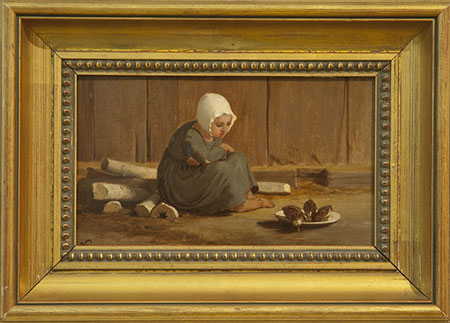The Motherless by Elihu Vedder – Wheaton College Massachusetts
Its gold frame warmly hugging the subject within, Elihu Vedder’s small oil painting depicts a young girl sitting in a barn looking over three baby chicks. The implication is that she is not just watching them, but caring for them. The title “The Motherless” applies not only to the chicks, but to the young girl as well. It leaves you to wonder about how she became an orphan and how long she has been one.
This piece left me not only with an ache in my heart but a reminder of the cliché that “you don’t know what you’ve got ‘til it’s gone” (Joni Mitchell). It illustrates the beauty of the human condition, when people, seemingly those who have lost the most, are the ones who give more than anyone would expect of them. One may suppose that a motherless child has lost the capacity to love, but in this painting, it is the orphan who has the capacity to see how much those baby ducks needed someone to care for them.
“Tool 1/3″
Descartes was a 17th century French philosopher famous for concluding “I think, therefore I am,” insinuating that one’s existence is only true relative to their own mind. Beyond this take being ridiculous on the surface level, after viewing this piece by Cory Lehroff Beirne, it becomes apparently true that this is not the case. We are social creatures, and beyond that, our existence and perception of the self is heavily relational. As is illustrated in this piece, one can see that most certainly “we are,” but “we are” merely in relation to others, no matter how much that hurts us.
This piece, which according Nia Budakova ‘24, depicts “humanoid figures huddle[ed] together, interconnected in an unhealthy union” who, according to the artist, are “both fatally void of hate but killing me just the same,” reminds me that “we are” who we are but not because “we think,” but instead we force ourselves ‘to be’ purely relationaly, with no hate towards the people who drag us down — despite how much it hurts us when they do so.
Embodied Labor: Care and Control leaves the Beard and Weil Galleries on March 25.
